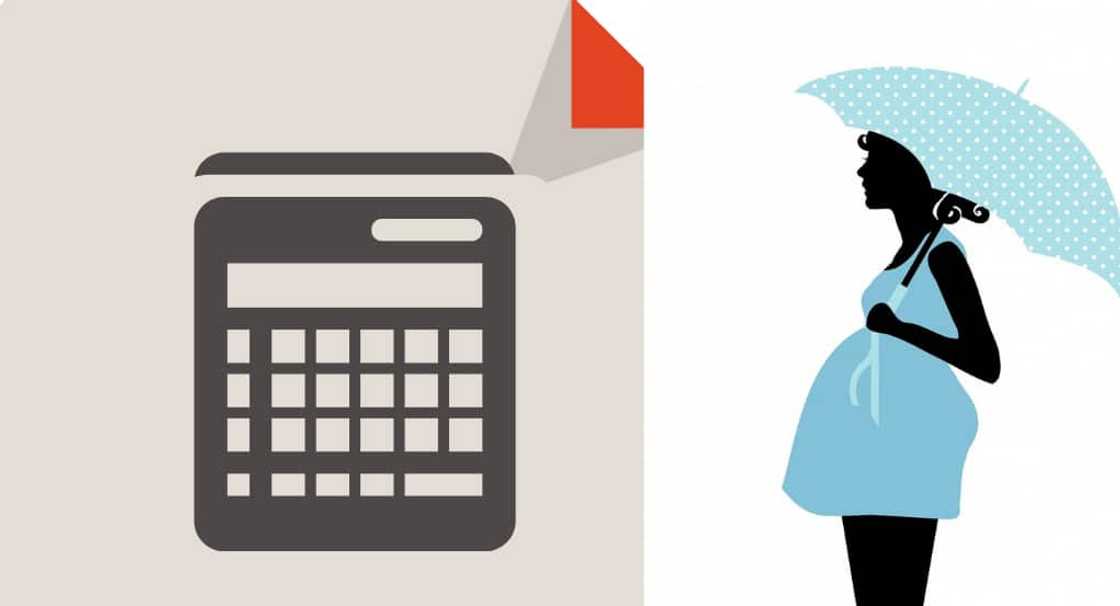All you need to know about pregnancy calculator
Some women, especially first-time mothers, may find it challenging to calculate the exact date of childbirth. Often, such women wait until an ultrasound scan is performed on them to estimate the expected delivery date. Thanks to technology, with a pregnancy calculator, you can find out when the baby is due from the comfort of your home.

Source: UGC
Knowing the exact date of childbirth helps one to prepare in advance by budgeting on the expenses of both the child and mother. Typically, a mother should give birth between 38 and 40 weeks after conception. However, the length of gestation may vary depending on various factors such as medication, weight gain, and nutrition. Nonetheless, the pregnancy due date calculator is a vital tool for an expectant mother.
Top facts about pregnancy calculator
Here are the details on how to use the pregnancy calculator by birth date as well as other vital facts about the prenatal period.
How to use the pregnancy calculator
There is one imperative detail you should know before using the online pregnancy calculator, the first day of your Last Menstrual Period (MLP). Well, here is how to go about it according to WebMD:
- Select the first day of your last period displayed on the pregnancy calculator calendar.
- Proceed by hitting the “Calculate” button below.
- An estimated due date will be generated to show the expected arrival date of the baby.
Other ways of calculating your due date
There are other four ways you can calculate the arrival date of the baby. They include:
1. Ovulation (OD)
Normally, ovulation takes place 14 days before a woman's period. So, assuming your OD is 8th May 2020, then your expected due date is 28th January 2021. You can have a look at the example and detailed results on BabyMed.
2. Due Date (DD)
Unlike other methods, this one requires you to input your estimated due date. After clicking "Calculate", it will show you the progress of your pregnancy in terms of weeks and days. For example, if your due date is 8th May 2020. You can see what the calculator will display.
3. Ultrasound (US)
This is the most efficient method of all the five. In most instances, it should be conducted by your doctor. Afterwards, you can enter the figures on the following calculator to estimate the arrival time of the baby.
4. IVF Transfer (IVF)
In this method, you are required to enter the date of transfer and type of embryo transfer. Usually, you will need to click the box, and a drop-down menu will appear to select the type transfer. Usually, such calculators look like the one on Flo.
NOTE: While most of the calculators may look different, they give the same result. Interestingly, some advanced calculators will even show you your current gestation time in weeks and days.
READ ALSO: Ectopic pregnancy symptoms, causes and early warning signs
Frequently asked questions (FAQs)
Below are the most common questions considering pregnancy.
How do I calculate my pregnancy?

Source: UGC
It is pretty simple and straightforward. When you click the first day of your last period, the pregnancy month calculator adds 280 days to your last menstrual cycle. For instance, assuming the cycle takes 28 days and the first day of your last period was on 1st May 2020. This means that you will give birth on the 5th of February 2021.
What day did I get pregnant?
Normally, fertilization or conception occurs between eleven and twenty-one days from the first day of your last period. You will either subtract 11 or 21 from the day to get the exact date. However, this applies if you experience regular menstrual period. You can go ahead and use the pregnancy test calculator to confirm.
Can you feel pregnancy symptoms at 3 weeks?
Well, there is a possibility you will not experience any early symptoms at this stage. Why? At three weeks, the body may not be ready to release detectable gestation hormones for most women. Also, a due date calculator may be useless at this stage.
At times, a small percentage of women can show the symptoms between two and three weeks after they miss their menstrual periods. In this case, their bodies release the human chorionic gonadotropin (hCG) hormone, which triggers body changes such as breast tenderness and fatigue.
How many weeks are in a pregnancy?

Source: UGC
Many physicians estimate the period to be 240 days, which is equivalent to 40 weeks. However, it is still normal for a mother to give birth at 38 weeks or 42 weeks. In other words, it is not strictly that one will give birth after nine months.
Remember, some women deliver 23 through 28 weeks, and the infants survive. Such kids are also known as preterm infants.
How accurate is the day of conception?
Most mothers tend to forget or even not notice the exact date they conceived. When this happens, they tend to get worried or even get ashamed. The efficient way to know is through an ultrasound scan. So, when the fetus is around twelve months, you can visit your doctor to find out.
What should you eat when pregnant?
It is essential for expectant mothers to observe proper nutrition during the gestation period. Some of the meals to eat include:
Vegetables
- Pumpkin
- Carrots
- Spinach
- Cooked greens
- Peppers
Fruits

Source: UGC
- Bananas
- Grapefruits
- Mangoes
- Oranges
- Tomatoes
- Honeydew
- Cantaloupe
- Prunes
- Apricots etc
READ ALSO: Signs of pregnancy week by week
Dairy
- Skim or 1% soy milk
- Low-fat yoghurt
- Cheese
Grains
- Ready-to-eat cereals
- Cooked cereals
Proteins
- Beans
- Salmon
- Chicken
- Peanut butter
- Lean beef and pork
- Cottage cheese
- Sardines
- Nuts and seeds
Each of these foods contains a vital element required by a mother and the growing fetus. So, make sure not to miss any of them.
What should you not eat when pregnant?
Giving birth to a healthy baby should be your priority. For that to happen, ensure you avoid the following meals, at all costs:
- Raw meat and eggs
- Unpasteurized meals such as hot dogs
- Soft cheese
- Fish with mercury levels
- Unwashed vegetables and fruits
- Pate
- Empty calorie meal
- Smoked fish
- Caffeine
- Alcohol
Can you fly when pregnant?
Yes. Some airlines allow expectant mothers to fly while others do not. Medically, it is safe, but again that may vary depending on the week of pregnancy. If you do not have any complications, you can fly up to when your pregnancy is 36 weeks.
Some airlines have strict policies that forbid flying after 28 weeks of pregnancy. Therefore, it is advisable to contact them in advance before you book a flight.
However, it is okay if it is a short flight. Even so, drink enough fluids and avoid gassy meals. This way, you will not experience nausea or other problems when boarding.
Pregnancy is an exciting journey for many mothers. Often, most of them pray that time could fly fast because of the strange changes that take place in their bodies. Well, you can utilize the pregnancy calculator throughout the period. You will be shocked to note how short nine months can be.
DISCLAIMER: This article is intended for general informational purposes only and does not address individual circumstances. It is not a substitute for professional advice or help and should not be relied on to make decisions of any kind. Any action you take upon the information presented in this article is strictly at your own risk and responsibility!
READ ALSO:
- UIF calculator- how much can you claim against UIF 2020
- All the important details about child maintenance | SA Maintenance Act
- 20 weeks pregnant: symptoms, signs and what to expect
Source: Briefly News







